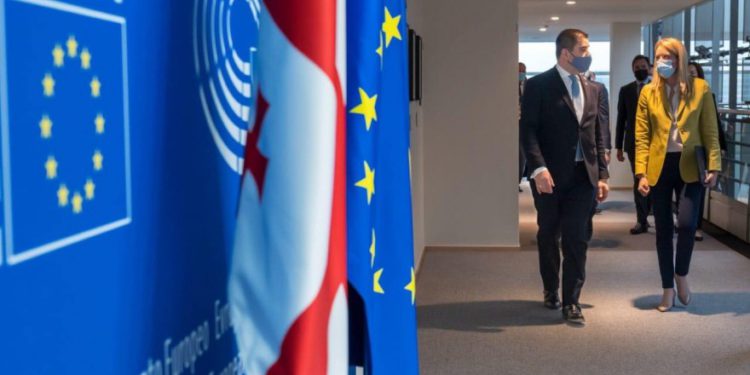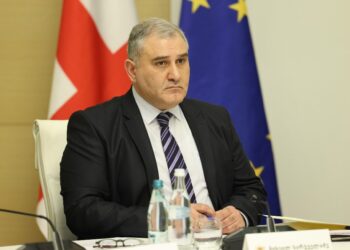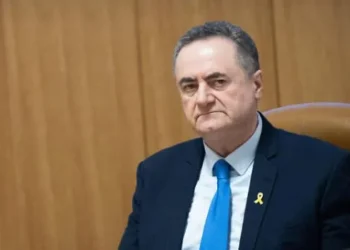The Speaker of the Parliament of Georgia, Shalva Papuashvili, addressed Roberta Metsola urging the granting of candidate status for EU membership to Georgia.
Georgia Today offers its readers the statement, unchanged.
“Dear Madam President,
Our most recent meeting during my visit to Brussels, and the very good conversation we had, inspired me to share some reflections on Georgia-European Union relations, especially at this historic juncture amidst our region’s unfolding geopolitical upheaval. I write you as I learned that there will be an urgent debate on Georgia in the European Parliament this Wednesday.
While a discussion on media freedom and safety of journalists is always important, for the sake of fairness, a wider context of Georgia’s application for European Union membership should be more relevant now than any matter related to the present political moment. Yet, while focusing on isolated instances, we should also keep in mind the impressive progress that independent media has achieved in Georgia in the past decade as a result of the country’s democratic transformation.
I, personally; my party Georgian Dream, which governs Georgia now; and every nine out of ten Georgians firmly believe the European Union to be the family and historic destination for our people. We formally applied for EU membership three months ago, and the entire country is gripped in anticipation of the decision of the European Council later this month. Rarely did any other political matter so emotionally tie our nation together before, as our application for the EU membership and the expected response from the EU member states.
As speaker of the Georgian Parliament, I represent the democratically elected highest political body of our nation and, am confident, I can deliver the unified voice of Georgians on our European destiny to the European Parliament.
Even before Georgia obtained independence, through the decades-long popular struggle against Communism and Soviet oppression, Europe was the cultural and political symbol and vector that drove what Georgians called our national liberation movement. Even amidst the externally imposed proxy conflicts in the 1990s, calls for European and Euro-Atlantic integration prevailed against any other alternatives in the national discourse.
The rule of law, democratic institutions, national stability, peaceful foreign and security policy, and economic and social reforms have been driven by the notion of unity with European nations. Every government and opposition party in the past three decades, since independence, while broadly diverging on many domestic issues, have never been divided over Georgia’s European and Euro-Atlantic aspirations. This unity gives me the right to reiterate our arguments as to why we suggest and, indeed, claim that we have the right to be a candidate country for European Union membership.
Most importantly, Georgia’s drive towards the EU and its history of democratisation have been powerfully interlinked. Georgia started implementing the EU acquis in earnest, after signing the Association Agreement in 2014, and we have done so despite existential threats. Indeed, we have successfully maneuvered through several challenging tasks of pursuing European integration, building democracy at home, and confronting near-permanent Russian aggression at the same time. At each stage, the prospects of joining the EU has only helped and encouraged democratic reforms.
We built peace and security together with Europe. We showed our dedication in Iraq, Afghanistan, Mali, Central African Republic, Kosovo, and elsewhere, wherever needed and called for by our European partners. In the past decade, Georgia proved itself to be a valued and reliable partner with its responsible foreign and security policy, which helped to maintain stability in the Caucasus and broader region, wherever Georgia’s contribution helped to make a difference.
There is a wide range of large-scale, successful reforms that buttress our relations. Georgia’s reforms and achievements in the fight against corruption, improved practice of doing business, fundamentally upgraded customs and public services, etc. have been praised globally, including by the EU and its member states. As a consequence of these efforts, Georgia has been a full-fledged member of European Energy Community since 2017; had visa-free access to the Schengen Area since 2017; signed the Association Agreement, including DCFTA, and has implemented 45 per cent of these agreements ever since. In comparison with the closest aspirant countries for EU membership, Moldova and Ukraine, Georgia is a lead performer in all three components of the Association Agreement – political dialogue, Deep and Comprehensive Free Trade Agreement, and sectoral/economic cooperation.
It is worth remembering that these achievements have been done in the context of actual aggressive actions and occupation of Georgia’s territories by Russia and permanent threats that have become so obvious to everybody in the context of Russia’s unprecedented brutal aggression against Ukraine.
Georgia’s achievements, and more so, prospects of future successes, make Georgia a desired prospective member of the EU in matters of the EU’s peace and security policy, energy independence, expansion of free markets, and, last but not least, cultural diversity.
Challenges remain. But the trajectory of the country clearly indicates a desire for progress, capacity for improvement and, above all, potential for enriching and strengthening the Union.
Georgia has made its move. It is the time for the EU to make its bid and grant candidate status for EU membership without delay given the current geopolitical pressures. Meanwhile, a steadfast and unequivocal backing from the European Parliament towards Georgia, together with Moldova and Ukraine, and calls for the European leaders to support our countries is vital and we look forward to such support.
Sincerely,
Shalva Papuashvili.”














